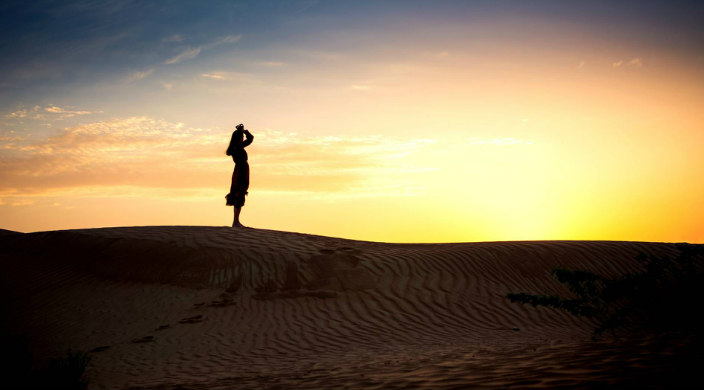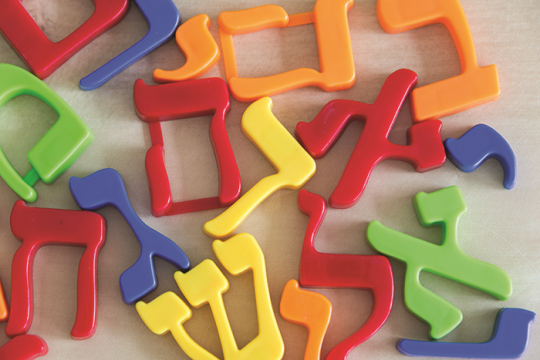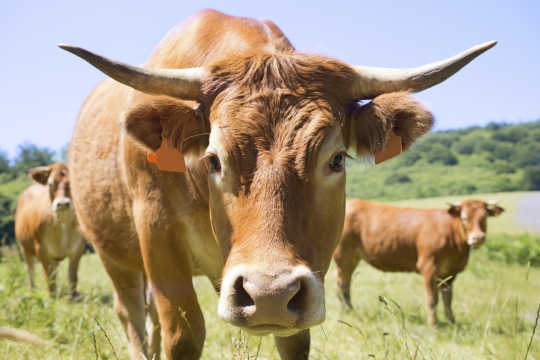
I felt a sense of déjà vu as we began to cancel plans and hunker down; the coronavirus-compelled communal self-quarantine felt vaguely familiar.
We’ve gotten through it before, and we will now, too. Here’s how.
We are a community in transition.
Travel plans canceled, classes suspended, in-person gatherings postponed… Our worship have reverted back to klei kodesh (clergy-led version), without communal singing; our Mishkan T’filah (Tent of Worship and Meeting) is shuttered for all but the smallest gatherings.
The understandable fear of infection and the scientifically certified need to “flatten the curve” forces us to quarantine ourselves, hunker down, and wait – though for what benchmarks and for how long, we don’t know.
Still, it feels familiar.
Here we are b'midbar (back in the wilderness), reliving Numbers chapter 12, when Miriam becomes infected with a scaly, white, and highly contagious skin condition.
Miriam the prophet – the soulful singer of new songs to God, whose wisdom discovers the wells of water in the wilderness – must cease her wonder-working to protect herself and her community. She quarantines herself outside the camp.
What did the Israelite community, by then millions strong, do when a plague of unknown proportions entered their midst? They stopped traveling, hunkered down, and observed a period of quarantine.
Then what happened?
The Torah says little about what they did during that painful period, and we hear nothing about Miriam’s suffering, though we can imagine it was significant.
The Torah is also silent about the worry of those who came into contact with Miriam before at the start of her infection. We don’t know how they passed the time, whether they interacted with others or stayed home in their tents. We know only that they made camp, stopped moving, and waited.
We know, too, that Miriam’s brother Moses, a leader of our people, cried out to the Healer of All with a prayer, brief but heartfelt and heart-wrenching:
El na r’fa na la.
Please God please heal her (Numbers 12:13).
Asking for healing, Moses twice beseeches the Holy One, doubling the word na (please) to emphasize the intensity of his desire.
We imagine him falling to his knees, worried and fearful, bent low by the twin burdens of keeping his community safe and seeking healing for his beloved sister, his partner in leadership.
Like him, we pray now:
El na r’fa na lanu.
Please God please heal us.
But our response shouldn’t end there.
From outside our usual communal camps, hidden in our homes, we imagine the actions of our ancestors: how they held strong and courageous amid unimaginable, listening to the voice of Miriam, from outside the camp, singing loudly in the distance. Singing songs of hope and healing.
We imagine that the women, taking up their timbrels again, joined her in song, spreading out like a comforting chorus to create across the camp the world’s first livestreamed liturgy of love.
We image children tossing stones at targets drawn on the ground outside their tents, laughing and playing games together though separated by distance, finding companionship in the ancient virtual reality game they created together.
We imagine that there were latrines to be dug and food to be prepared (but in separate areas and always accompanied by vigorous handwashing), and that the people arranged the sharing of resources and comforted the confused and the anxious.
Life went on, though separated by social distancing – but better yet, life went on as they practiced physical distancing but continued socially connecting.
And they told stories.
In heartwarming moments, we might have glimpsed through the tent flaps to see parents and children, aunts, uncles, cousins, and grandparents, telling stories to one another and reading into the moment a reimagining of our ancient heroes.
Stories about Noah and Naamah, whose strategic planning (building an ark, gathering the animals, collecting seeds for the future) saved the animals and themselves. They remind us that in working together, in spite of the trauma to come, we can find a way forward and, hopefully, through.
Stories about Isaac, the assaulted, who struggled to find meaning in a life torn apart by the painful experience he endured as a youth, yet who nonetheless opened his heart to the love of Rebekah and thus found a way forward. He reminds us that with love and partnership, we can overcome debilitating anxiety and fear.
And stories about Sarai, the soulful one, who dug deep amidst her despair to find strength to feed the stranger-wanderers and, learning that there would be hope for her future – a child to be born – she laughed. She reminds us that amidst great pain, we can still find great joy.
Let’s laugh, love, and support each other now.
We’ll never know what went on in the Israelite camp when a plague of unknown proportions threatened the very survival of the people.
But imagining, as we Jewish midrashicists are wont to do, we can see it all clearly: People planned and played, shared and showered each other with love. They told stories and sang songs, creating social connection amidst the physical distance.
And healing came to Miriam, finally. Though we never learn whether others were infected or died of the disease, sadly we imagine that too many did – and that when they did, the community buried their dead with honor and love. Then, breathing an exhausted sigh, they packed up and moved on.
And eventually, we will, too.
This piece was first published on Rabbi Paul Kipnes's personal blog. This shortened version is republished with permission; to read the original piece, visit paulkipnes.com.
Related Posts

Eight Hebrew Words and Phrases You Can Use Every Day!



